

10 life & career lessons I learned from racing Ironman - Part 1 — S E Perform. Get In The (Pre-Race) Zone. The importance of eliminating pre-race distractions, plus how to visualize race-day success.
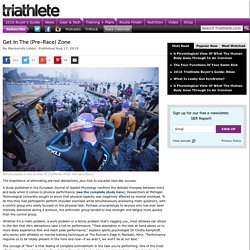
A study published in the European Journal of Applied Physiology confirms the delicate interplay between mind and body when it comes to physical performance (see the complete study here). Researchers at Michigan Technological University sought to prove that physical capacity was negatively affected by mental workload. To do this they had participants perform shoulder exercises while simultaneously answering math questions, with a control group who solely focused on the physical task. Perhaps unsurprisingly to anyone who has ever been mentally distracted during a workout, the arithmetic group tended to lose strength and fatigue more quickly than the control group. Whether it’s a math problem, a work problem or a family problem that’s nagging you, most athletes can attest to the fact that life’s distractions take a toll on performance. RELATED – Psych Out: Dealing With Race-Day Anxiety. Lisa Norden Shares Journey Back To Olympic Form In New Video.
After celebrating an Olympic silver medal in one of the most exciting races of all time, Lisa Norden was burnt out, exhausted from racing and needing to take a break before building back up.
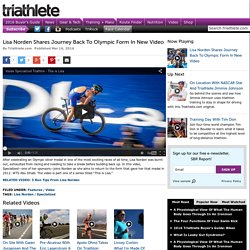
In this video, Specialized—one of her sponsors—joins Norden as she aims to return to the form that gave her that medal in 2012. WTS Abu Dhabi. The video is part one of a series titled “This is Lisa.” RELATED VIDEO: 3 Run Tips From Lisa Norden. 3 Reasons to Train with Purpose. Roger Bannister, the first man to break the four-minute-mile barrier, talked about the purpose for which he ran in his autobiography, “Four Minute Mile.”
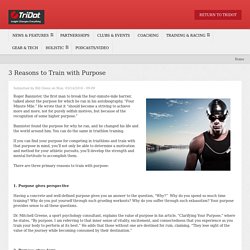
He wrote that it “should become a striving to achieve more and more, not for purely selfish motives, but because of the recognition of some higher purpose.” Bannister found the purpose for why he ran, and he changed his life and the world around him. You can do the same in triathlon training. If you can find your purpose for competing in triathlons and train with that purpose in mind, you’ll not only be able to determine a motivation and method for your athletic pursuits, you’ll develop the strength and mental fortitude to accomplish them. There are three primary reasons to train with purpose: 1. Having a concrete and well-defined purpose gives you an answer to the question, “Why?” Dr. Visualise your way to triathlon success like a pro - Beginners - 220Triathlon. “Sometimes when I run and there’s long grass beside the path, I high-five the grass like it’s the spectators in the finish chute, visualising having an awesome race and winning Kona.
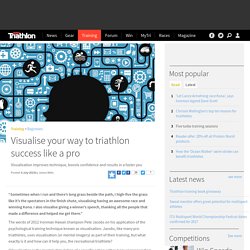
I also visualise giving a winner’s speech, thanking all the people that made a difference and helped me get there.” The words of 2012 Ironman Hawaii champion Pete Jacobs on his application of the psychological training technique known as visualisation. Jacobs, like many pro triathletes, uses visualisation (or mental imagery) as part of their training, but what exactly is it and how can it help you, the recreational triathlete?
“Visualisation is the mental stimulation of a specific action without any corresponding motor output,” explains Dr Martin Turner, lecturer in sport and exercise psychology at Staffordshire University. “In essence, you imagine your physical performance without actually physically moving.” We Started As Runners. In the spring of 2012, my husband and I were out of shape and looking for a way to become more fit.

We walked our dogs approximately 2 miles daily, but that was the extent of our exercise routine. Neither of us considered ourselves athletic. I danced in grade school, but did not play sports in high school or recreationally. Nick played lacrosse in high school and picked up running in college. We decided to give running a shot. We began the Couch to 5k running plan in October of 2012. Our first 5K race, the Rudolph Run, was in December of 2012. On one of our runs the previous year, we happened upon the Ironman Texas. We purchased road bikes and the absolutely necessary riding shorts in April of 2014. We joined a gym in January to have access to a pool. I believe we have found our niche; swim, bike, run is a great combination for us. Topics: Running. MICHAEL PHELPS. 9 Tools For Boosting Mental Toughness.
Whether the goal is to finish a first event, break a time goal or win the thing, a race isn’t truly satisfying unless we come face-to-face with the inner weakness that tries to sway us toward giving less than the body is capable of or throwing in the towel altogether.
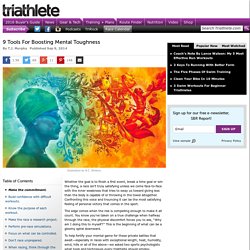
Confronting this voice and trouncing it can be the most satisfying feeling of personal victory that comes in the sport. The edge comes when the risk is compelling enough to make it all count. You know you’ve taken on a true challenge when halfway through the race, the physical discomfort forces you to ask, “Why am I doing this to myself?”
Sports Psychology Tips For Triathletes. Some of the biggest sports performance killers have nothing to do with the physical and everything to do with how well equipped you are to deal with psychological challenges.
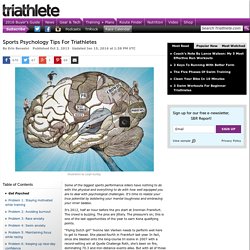
The best athletes are great problem solvers under adverse situations. In practice, they want to be pushed mentally, not just physically. McCaw Method - 3 reasons why mentally tougher athletes... "Intent and focus are always two words I write down before a race. They're highlighted and circled." -@gwenjorgensen #usatjuniors. Secrets of Kona Qualifiers Music and Mantras.
Developing Mental Toughness: Are you Tough Enough? Goal Setting Sports Psychology, Imagery & Simulation – Mind Tools. Triathlon Geek. Greatest Motivation Ever ᴴᴰ.